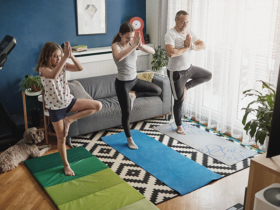Manage Stress – Today, this world is moving so fast that stress has become a part of life. It is mainly attributed to work, family, or pressure from the deadlines that one has to meet. Stress can affect our mental and physical health badly. It is not just about remaining calm but also about having a balanced lifestyle by which you deal with the challenges of life as they come along and do not let them surround you and affect your life. Here’s how to do it:
Manage Stress:
1. Identify what is causing you to be stressed:
Understand that for you to cope better with stress, you have to find its causative factor. Is it because of the work, the personal relationships, or even financial issues? Once you identify what triggers your stress, you can then work on trying to solve it. Sometimes, keeping a journal makes it easier to track when and why you feel stressed. This could help you track patterns and perhaps even find some solutions.
2. Deep Breathing and Mindfulness:
What you can do on the spur of the moment if you are to do anything for stress when it strikes is take a few deep breaths. This allows your body to feel the effects of the relaxation response, which is going to slow down your heart rate and loosen up the constriction inside.
Try the following: Breathe in through your nose for 4 seconds, hold your breath for 7 seconds, and then exhale slowly through your mouth for 8 seconds. Do this for a few minutes when you feel stressed each time.
Mindfulness is another technique which is very effective. It develops control over your own feelings and emotions by releasing power over negative anxiety issues with total focus on the present moment, allowing you to accept your thoughts and feelings without judgment.
3. Regular Exercise:
Exercise is a sure way out of the stress syndrome. You will always give back to your body, endorphins – natural mood enhancers. Going for brisk walks, doing yoga, or even high-intensity training somehow clears the mind, and the overall feeling of well-being is felt immediately.
Tip: Keep yourself busy with at least 30 minutes of moderate exercise daily, five times a week. That will reduce your stress level while keeping your body fit and healthy.
4. Sleep RIGHT:
Such sleep is considered the prestage health indicator for good physical and mental well-being. Poor sleep can make the body more sensitive, thereby piling up stress, making things even more challenging to handle as one faces the daily challenges. One can ensure 7-9 hours of quality sleep each night by sleeping on a regular schedule through a day routine.
- Some good tips on sleep habits
- Limit or avoid intake of caffeine and electronic devices before sleep.
- Your bedroom should be quiet, dark, and cool
- Take up some form of relaxation techniques such as reading or some soothing music playing
5. Communicate and Express Your Tension to Others:
Sometimes talking to your loved one about your stress just helps. Talking over your thoughts and feelings with friends or family members or even with a therapist may bring about new ideas or solutions to problems you might have not otherwise considered. This way, creating a support network means that you will not be carrying the burden alone.
Tip: If you feel comfortable with it, share what is stressing you. That is not going to make you weak; that’s just a healthy coping behavior .
6. Responsible and realistic goals with effective time-management:
The large to-do list is a major stressor in itself. Learn to become good at time management so that you are not always forced to be overwhelmed. Learn to begin prioritizing what has to be done, set realistic expectations of when something will be done, and stop saying yes to everyone, because you do have too much piled up on your plate.
Action Plan: Great large tasks also have to be broken into smaller steps that one can manage. Celebrate little wins as you get them along the way.
7. Things You Enjoy Doing for Fun:
Time spent in hobbies and activities that have brought you some amount of joy is a good stress reducer. For some of you, it would be painting or gardening or reading or some favorite hobby; and so, you’ll be distracting yourself from stressful thoughts that are hovering in the mix of your mind with something very meaningful to you and balancing it out in life.
8. Balanced Diet:
How much stress you can handle is also dependent upon the type of food you consume. A diet high in whole foods, fruits, vegetables, and lean proteins will power both your body and brain in the hopes of helping you navigate through the stress. Limit caffeine and sugar, and cut down on processed foods that will put your anxiety level into overdrive and have the opposite effect on your mood.
Tip: Consume foods rich in omega-3 fatty acids like salmon, magnesium like spinach, and antioxidants like berries. These all help the brain to remain healthy
9. Learn to Let Go:
Of course, one of the biggest sources of tension is trying to manipulate matters that are forever beyond your control. You need to understand that some things cannot be controlled-things left completely to the whim and capriciousness of fortune. As part of learning how to let go of the things you can’t change, you free yourself from unnecessary worry and anxiety.
Practice: The next time you feel crushed by something outside of your control, remind yourself to focus on what you have the power to do, and the rest will follow.
10. Get a Professional Helping Hand if Needed:
Stress is stressful enough if it becomes too heavy and starts weighing down on your daily life. Never wait to get professional help through a mental health professional. Therapy or counseling allows one to acquire very effective tools and strategies to channel stressful energies into more efficient management. It is well worth remembering that to seek help indicates strength, not weakness.
Conclusion:
Stress is unavoidable, but it shouldn’t be allowed to override your life. With the inclusion of these simple yet effective techniques in your daily routine, you’ll manage stress much better and build a balanced lifestyle for your well-being. Remember that for the key of stress management, being proactive is a basic principle, and it’s always one step forward in recognizing even tiny changes that make huge differences.


















Leave a Reply